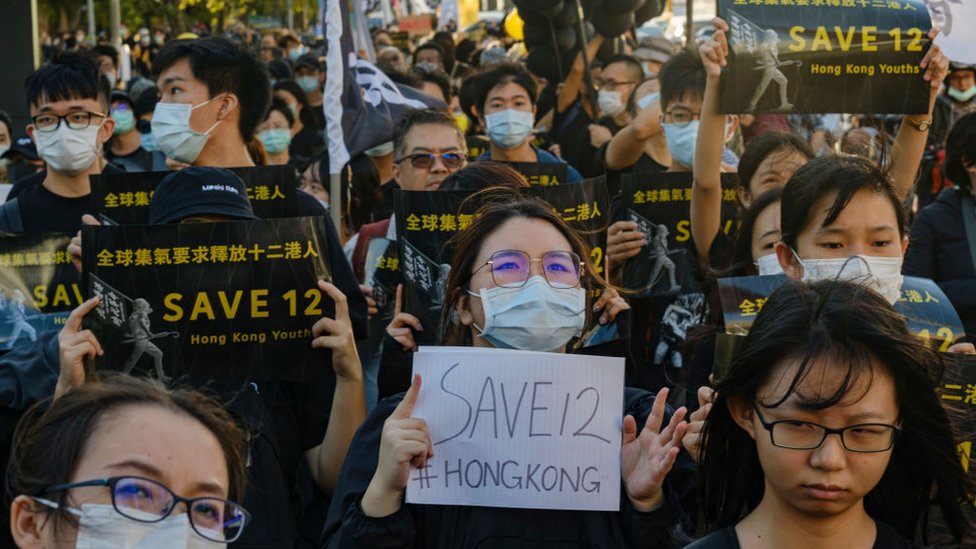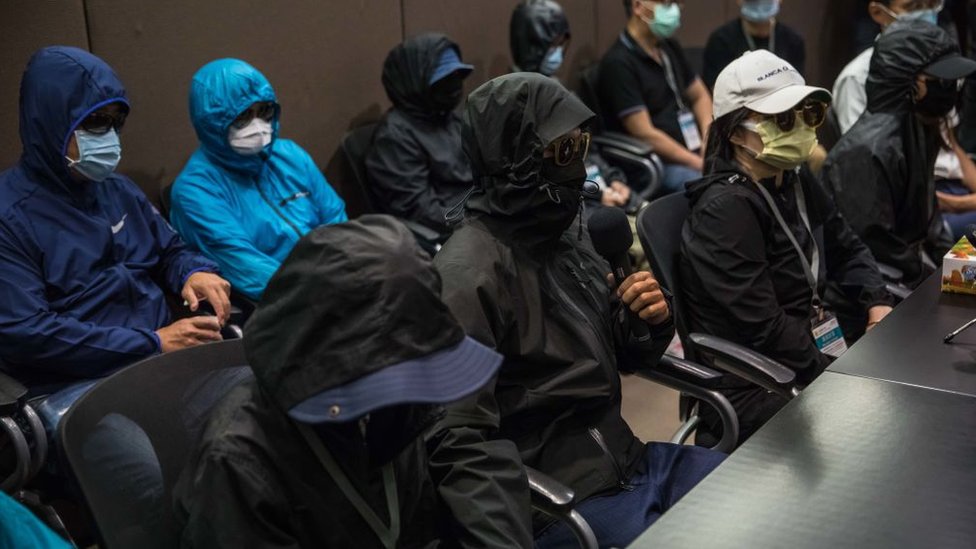
Ten Hong Kong activists arrested at sea as they tried to flee to Taiwan by speedboat have been jailed by China for between seven months and three years.
Two minors - of the youth group dubbed the Hong Kong 12 - have been returned to Hong Kong.
The activists were caught in August as they made a rare attempt to escape the city after a harsh new security law was introduced by Beijing in June.
The case has drawn global attention and concern about the detainees' treatment.
The Shenzhen Yantian District People's court sentenced Tang Kai Yin, 31, and Quinn Moon, 33, to three years and two years in jail, respectively, for organising an illegal border crossing, a statement said.
The remaining eight activists were sentenced to a "lighter punishment" of seven months in prison for illegally crossing the border, it added.
The two minors - now aged 17 and 18 - were handed over to Hong Kong police at around noon, reported AFP news agency.
The case of the Hong Kong 12 has triggered widespread criticism at at a time of growing fears about the semi-autonomous territory's evaporating freedoms.
The group had been held virtually incommunicado since they were taken into custody in the southern Chinese city of Shenzhen, with no access to their families or the lawyers they had hired.
"We have to remember that they were locked up in China cut off from the world, their families and lawyers of their choosing for four months before attending a mock trial where only CCP-approved [Chinese Communist Party] players were allowed in," said Beatrice Li, the sister of Andy Li, one of the jailed activists, according to Reuters news agency.
After the sentencing, rights group Amnesty International said the youths were "at risk of torture after an unfair trial".
"These sentences meted out after an unfair trial lay bare the dangers faced by anybody who finds themselves tried under the Chinese criminal system," Amnesty International's Asia-Pacific regional director Yamini Mishra said in a statement.
What led to their arrests?
The 12 Hong Kongers - aged 16 to 33 at the time of their detention - were intercepted at sea by the Chinese coastguard on the morning of 23 August, just 40 miles (70 km) southeast of Hong Kong.
Most of those on board were already facing charges at home linked to the huge pro-democracy protests that swept the former British colony last year.
That meant they could not leave the territory by regular means.
At least one of the activists was being investigated under the controversial national security law.
Since late last year, Taiwan has emerged as a tacit sanctuary for Hong Kong activists escaping a growing crackdown on protesters.
The Washington Post reports that hundreds of Hong Kongers have sought refuge on the island, most arriving legally by air but some using smugglers to reach by boat.
The case of the 12 detainees has highlighted the growing struggle for democracy activists in Hong Kong, which was once a key destination for refugees fleeing persecution.
What happened next?
For months after their arrests the activists were held in detention without charge in the mainland city of Shenzhen.
A few weeks ago Chinese authorities finally charged 10 of the group: eight were accused of illegally crossing the border, which carries up to two years in jail, while two faced the more serious charge of organising the crossing, punishable by up to seven years.
The defendants went on trial on Monday in Shenzhen.
The hearing was closed to foreign reporters and diplomats - as many are in China - but the court said in a statement that both prosecution and defence lawyers spoke.
On Wednesday, Chinese authorities said the 10 convicted activists had pleaded guilty while the two minors had admitted wrongdoing.
Lawyers for the activists said the eight who received the lesser jail terms should be able to return home on March 24 to take into account the time they have already served.
They also said the sentences were too heavy and that the allegation of organising a border crossing was not substantiated, according to AFP.
What have the families said?
The families of the activists had earlier expressed their fears about the fates of the detainees in China's notoriously opaque judicial system.

The Chinese lawyers some of them had hired were barred from seeing their clients as authorities stepped in to appoint state-approved counsel.
They were only notified of the trial date, the families said, three days before the hearing.
Over the weekend they had published an open letter to the international community, appealing for its help to "safeguard the legal rights" of the detained 12.
What has the wider reaction been?
The high-profile case has been closely watched in Hong Kong and abroad as a rare instance of Chinese authorities arresting people trying to leave the territory, at a time of mounting concerns about its eroding autonomy.
Supporters of the Hong Kong 12 have rallied in at least a dozen cities around the world - from Taipei and New York to Adelaide and Vancouver.
Hours before the trial on Monday the US embassy in China urged the "immediate release" of the activists.
"Their so-called 'crime' was to flee tyranny," a US embassy spokesperson told AFP.
"Communist China will stop at nothing to prevent its people from seeking freedom elsewhere."
The Chinese ministry of foreign affairs responded, calling on the US to "immediately stop interfering in China's internal affairs through the Hong Kong issue".
https://news.google.com/__i/rss/rd/articles/CBMiNGh0dHBzOi8vd3d3LmJiYy5jby51ay9uZXdzL3dvcmxkLWFzaWEtY2hpbmEtNTU0ODE0MjXSAThodHRwczovL3d3dy5iYmMuY28udWsvbmV3cy9hbXAvd29ybGQtYXNpYS1jaGluYS01NTQ4MTQyNQ?oc=5
2020-12-30 07:37:00Z
52781274902910
Tidak ada komentar:
Posting Komentar